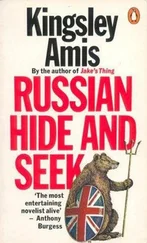This evidently went unnoticed. The Foreign Secretary, judging his audience to be adequately softened up by abstruse information, modulated to an account, statistically supported, of German atrocities in Poland. This led to a more lyrical passage on the theme of Russo-Polish brotherhood in arms, followed by a carefully worded suggestion that Russia had earned the right to get things set up her way at her end of Europe. Next, a designedly short paragraph on the Americans, in which protestations of admiring gratitude — meant to fool nobody — introduced the message that to have fought for the liberation of a continent brought with it no automatic right to a say in its future, and that the sooner the Yanks realized this and cleared off back to their own half of the world the better for everyone.
There was some show of applause here on both sides of the House, and a voice from the Visitors’ Gallery was heard to say that the fellow was talking a bit of sense at last. Mildly encouraged, trying not to look at the Under-Secretary to the Home Office, the Foreign Secretary turned to a fresh page of his notes. ‘Next, the Middle East,’ he said.
Immediate uproar broke out in all parts of the chamber. Those who had managed without apparent protest to sit through a deluge of information about the Silesian coalfields found they could not contemplate further lessons on the break-up of the Ottoman Empire or, it might be, the average weekly take-home pay of the Egyptian fellaheen . The Prime Minister felt it his duty to intervene. ‘Turn it up, Hargy,’ he called. ‘You’ve had nearly twenty minutes now. Give the other lot a go, eh?’
The Foreign Secretary addressed the Speaker. ‘What do you say, Mr Archer?’
‘Well,’ — the Speaker glanced to and fro — ‘I think we might split this up a bit, don’t you? Sort of debate parts of it at a time? How much more stuff have you got there?’
‘About as much again, sir.’
There was a general groan and some shouts of ‘Shame!’
‘Order, order,’ the Speaker said, blushing slightly. ‘I think if you don’t mind, Hargreaves, we might hold the rest of your speech for now. Let’s hear from Sergeant — sorry: I now call upon the Leader of the Opposition.’
This personage, the left breast of whose uniform bore several campaign-medal ribbons, turned and exchanged energetic whispers with his colleagues. After a time he stopped shaking his head violently and started nodding it feebly.
Like many another political leader, he owed his position less to talent or even ambition than to a group of deficiencies: lack of general unpopularity, of immoderate enthusiasms, of firm views about anything. Sergeant Fleming helped his officers without taking their part in their absence, fiddled the stores inventory but not the leave roster, never stood the Company Quartermaster-Sergeant more than one extra drink an evening, helped to carry his passed-out mates to their billets and then dropped them on the floor. A natural middle-of-the-road man, Fleming, and equally naturally a Tory through and through, or perhaps just through. Nobody had thought of questioning his nomination as titular head of the alternative to a Government that extended, Popular Front fashion, from the Trotskyist at the Colonial Office to the Moral Rearmament International Christian Democrat who had found himself Chancellor of the Duchy of Lancaster.
Fleming’s head was nodding faster now, though no less feebly, in fact slightly more so. He got up and said loudly and indistinctly: ‘Well, we’ve heard what my learned friend, that is the Foreign Secretary, what he’s had to say about what he thinks ought to be done about foreign countries and that. And I must say I’ve never heard such a load of rubbish in all my born days. It beats me that a so-called educated man with all his intelligence can talk all that rubbish. What do we care about all these Poles and French? They let us down, didn’t they? No, we’ve got to look after ourselves because there’s nobody else will. Break them all up into small states so’s they can’t start anything, that’s the only way. Eh? All right, Bert. Well, I’m going to give you our military expert now because you’ve got to keep the peace, haven’t you? That’s the first thing, so I’ll hand you over now to Sergeant Doll.’
The military expert’s military aspect was half misleading. He was in the Army all right, but the shape and condition of his moustache, the unnecessary presence round his waist of a splendidly furbished webbing belt, the very knot of his khaki necktie suggested the Officers’ Mess at some exclusive armoured-car regiment of incessantly invoked lancer or hussar ancestry, rather than the Orderly Room at an unemployed half-unit of the Royal Corps of Signals. Doll’s extreme efficiency behind the sergeant’s desk in that Orderly Room was perhaps what had led him, in compensation, to adopt this heavily martial persona. If so, he would only have been acting out on an individual and more symbolic scale the compulsion (born of the inferiority feelings common to all technical troops) that had afflicted his superiors during the period of training in England. All present could very well remember the cross-country runs, the musketry competitions, the three-day infantry-tactics schemes with smoke-bombs and a real barrage, the twelve-mile route-marches in respirators which had seemed in retrospect to show such a curious power of inverted prophecy when the unit finally completed its role in the European theatre of war without having had to walk a step or fire a shot.
One of the most convinced proponents of these early rehearsals for death or glory was at the moment sitting in the Visitors’ Gallery with a hard expression on his soft face. He was Major R. W. Raleigh, the commander of a communications company until just after the German surrender, and now, the bulk of the unit having departed to help furnish signal facilities at the Pots-dam Conference, the overlord of a sort of dispirited rump. This, originally comprising most of his old company with the addition of a spare section from the cable-laying company, had been swollen by successive injections administered by higher authority. In the chaos of disbandments, postings, re-formations and moves to the United Kingdom that characterized the aftermath of the campaign, a command like the major’s represented a handy point of stabilization, a nucleus for any sort of drifting particle.
Expansion, once begun, had been rapid. Daily erosions took place as a corporal with one set of qualifications or three signalmen with another suffered removal for eventual use in the Far East, but these were far more than redressed by reinforcements. At one time or another, and with or without warning, there had arrived a further cable-laying section that had proved superfluous at Potsdam, most of the small but variegated Signals formation lately serving a now demolished independent parachute regiment, half a Base company without any officers or sergeants, an entire technical-maintenance section without any transport or stores, and two or three dozen teleprinter-operators, lineman-mechanics, drivers, electricians and fitters who had turned up individually or in little groups. All this amounted to a ration strength of something like twelve officers and four hundred other ranks, a total quite impressive enough to justify such gestures as renaming the original company office the Orderly Room and starting to refer to Sergeant Doll, the chief clerk in that office, as the Orderly Room Sergeant.
The major thought of Doll as a useful lad, and never more so than this evening. A certain amount of undisciplined behaviour, of affected intellectual nonsense, even of actual hints of disloyalty to the country — these were to be expected of a mock parliament, but there was surely no need for the thing to turn out quite so mock as it had. The blokes seemed to think that they could simply get up and say whatever they liked. Where that sort of attitude got you had been made all too clear at the previous sitting, when the bunch of jokers who called themselves the Government had brought in their Nationalization Bill. This meant, apparently, that they were in favour of collaring the coalmines, the steel industry, transport, public services — everything that created wealth and employment — and running them as they saw fit. That could never happen in the real world, in England, but the major could not agree with his friends in the Officers’ Mess that the passing of that Bill merely showed how idiotic the whole issue had become — he wished he could. No, it was far more serious than that: the indication of a really ugly mood. He had too much sense of responsibility not to have come along tonight to keep an eye on things, use his influence to stop them getting out of hand. He hoped he would not have to intervene. It would not be necessary if Doll did his stuff properly, and Doll surely would. Reliable fellow, Doll, even if he was a bit of a puzzle. That perpetual parade-ground appearance and manner — what was it all in aid of?
Читать дальше












